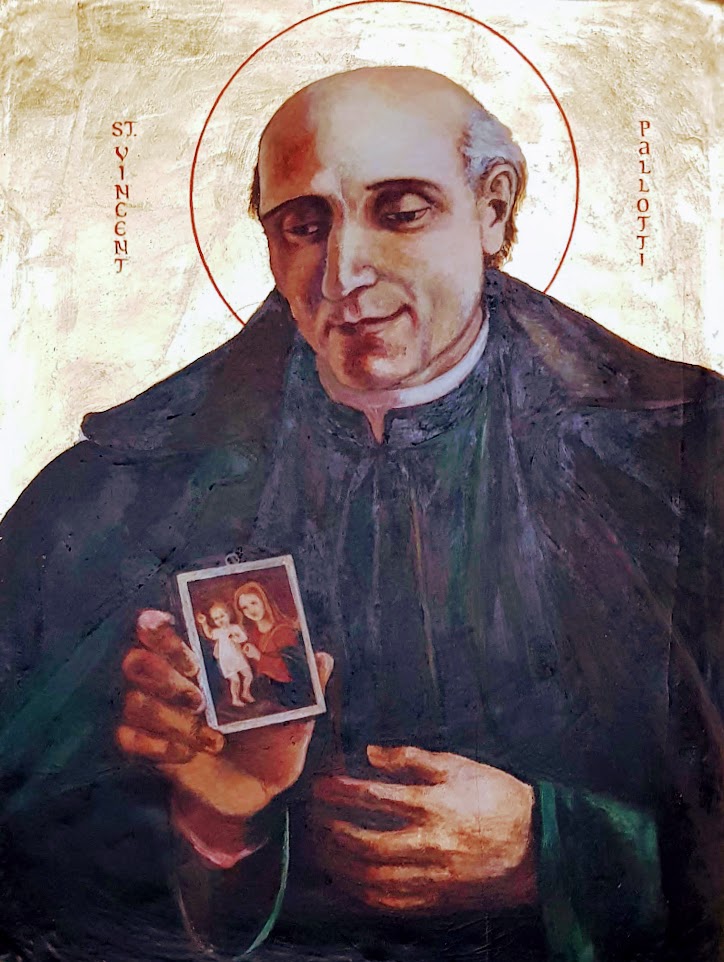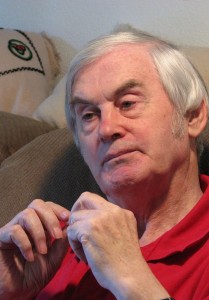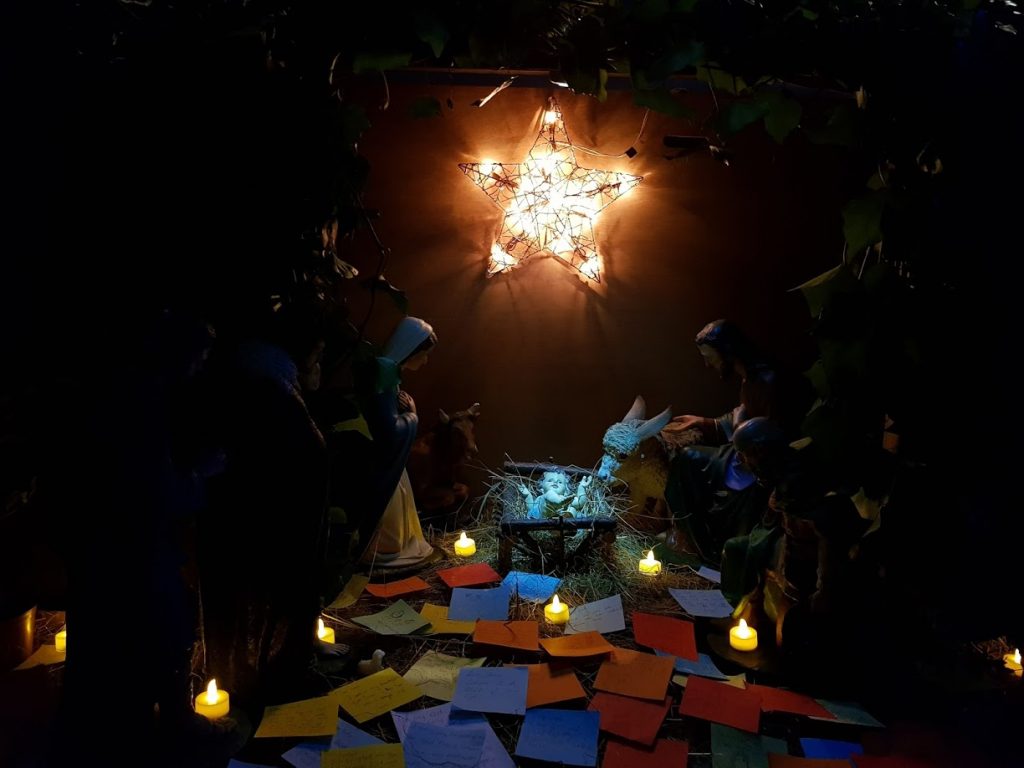Vincent Pallotti died on the evening of January 22nd 1850, he was canonised on January 20th 1963, and so it is fitting today, January 21st, to revisit one of the final prayers of his life. The Benedicite is his own ‘O bless the Lord‘, and the context is the Benedicite found in the book of Daniel 3, 58-87. St Vincent intersperses verses from the book of Daniel with reflections on his own life. It is a prayer of thanksgiving for his entire life which was dedicated to God and his work and shows that Vincent was acutely aware that the good done was through the grace of God.
The ‘Benedicite’ of Fr. Vincent Pallotti,
composed shortly before he died (OOCC X, p. 488-95).
All things the Lord has made, bless the Lord: give glory and eternal praise to him (Dan. 3,57).
Lord Jesus, banish me from within myself and replace me with yourself.
May my life and all my actions be destroyed and may your life be my life.
May your agony be my agony, your death my death,
your resurrection my resurrection.
May your ascension be my ascension;
may all things that are yours, be mine,
may the life of the blessed Trinity be my life.
O all you works of the Lord, o bless the Lord.
To him be highest glory and praise for ever (Dan. 3,57).
A sinner was I conceived (Ps. 50,7);
but the conception of Jesus Christ has destroyed my sin
and the conception of Christ is my conception.
And you, angels of the Lord, o bless the Lord,
and you, heavens of the Lord, o bless the Lord (Dan 3, 58).
I lived in my mother’s womb, without faith, without hope, without charity;
but the merits of our Lord Jesus Christ
which he acquired in the womb of the Blessed Virgin Mary
through the charity and mercy of God are my merits.
And you, waters above the heavens, o bless the Lord,
and you, armies of the Lord, o bless the Lord (Dan 3,60).
I was born under God’s anger (Eph 2,3);
but Jesus Christ’s poor and humble birth
made me a child of God, a friend of God,
an heir of God, a co-heir of Christ (Rom 8,17),
and replenished me with every good.
And you, sun and moon, o bless the Lord,
and you, stars of the heavens, o bless the Lord (Dan 3,62).
In the first days of my life I did not do any action worthy of eternal life;
but through the great charity and goodness of God
and through the sweetness of his divine mercy,
the merits which Christ had from his infancy can be my merits.
And you, showers and dew, o bless the Lord,
and you, breezes and winds, o bless the Lord (Dan 3,64).
I grew in age, in wickedness and in ignorance, culpable ignorance;
while Jesus grew in age, in wisdom and in grace in the sight of God and before men;
may the same merits of Jesus’ growth to maturity
destroy my wickedness and my ignorance.
And you, fire and heat, o bless the Lord;
and you, cold and heat, o bless the Lord (Dan 3, 66).
That which I should have done, I did not do,
and that which I should have omitted, I did not omit.
I should have obeyed those to whom I owed obedience,
but I did not obey them;
but the actions, the virtues and the obedience
which Jesus showed in his relationship with Joseph
and the Blessed Mother Mary,
through the charity and mercy of God,
are my actions, my virtues and my obedience.
And you, showers and dew, o bless the Lord,
and you, frosts and cold, o bless the Lord (Dan 3, 68).
I received baptism; but I did not profit from it as I should have.
In confirmation the Holy Spirit, the Paraclete, descended on me;
but I thwarted him always.
But the baptism of Christ is my baptism,
and the fullness of the Holy Spirit which was in him is my fullness.
And you, frost and snow, o bless the Lord,
and you, night-time and day, o bless the Lord (Dan 3, 70).
To me and to others it appeared as if I fasted, kept vigil, prayed;
but all my fasts, my vigils and my prayers
are as nothing before the Lord.
However, through the charity and mercy of God,
Christ’s fasts, vigils and prayers, are my fasts, vigils and prayers.
And you, darkness and light, o bless the Lord,
and you, nights and days, o bless the Lord (Dan 3,72).
To me and to others it appeared as if I worked and taught well;
but I have not done anything other than evil and all evil.
I did not instruct the faithful as I should,
I did not preach the Gospel of Christ to all creatures (Mk 16,15);
but the works of Christ and his preaching of the Kingdom (Lk 10,9)
are my works and my preaching.
O let the earth bless the Lord,
to him be highest glory and praise for ever (Dan 3, 74).
To me and to others it appeared as if I brought back the lost sinners
to Christ’s flock;
but I through my great and numerous scandals have rather
distanced numerous souls which are dear to God and to Christ,
from Christ’s fold.
But all the labours and the zeal of Jesus Christ the Good Shepherd,
are my labours and my zeal.
And you, mountains and hills, o bless the Lord,
and you, all you creatures that live on the earth, o bless the Lord (Dan 3,75).
To me and to others it appeared as if I healed the sick (Lk 10,9),
but through my sins all men became ill.
I did not restore sight to the blind;
I did not cause the lame to walk (Mt 11,5),
I did not make the deaf hear,
I did not make the dumb speak
I did not raise the dead.
But, through the great charity of God and his holy mercy
all Christ’s works of charity are my works.
And you, fountains and springs, o bless the Lord,
and you, rivers and seas, o bless the Lord (Dan 3, 77).
To me and to others it appeared as if I evangelized the poor (Lk 4,18);
I, rather, have given scandal to all.
But Christ’s preaching to the poor is my preaching.
And you, creatures of the sea, o bless the Lord,
and every bird in the sky, o bless the Lord (Dan 3, 79).
To me and to others it appeared as if I had instituted something good;
but I have done all that which is evil
but all that Christ instituted is mine.
And you, wild beasts and tame, o bless the Lord,
and you, children of men, o bless the Lord (Dan 3, 81).
I did not baptise all peoples, but rather because of my sins,
innumerable persons have died without baptism.
And yet through the infinite charity of God
and through his holy mercy the institution of the baptism of Christ,
its propagation and its fruits are my propagation and my fruits.
O Israel, bless the Lord, praise and exalt him for ever (Dan 3, 83).
Because of my poverty and my lack of holiness
I have never profited from the ineffable institution of the
most holy Eucharist;
but through the holy mercy of Jesus Christ I have been filled
with every grace, as if I had fully profited from it.
And you, priests of the Lord, o bless the Lord,
and you, servants of the Lord, o bless the Lord (Dan 3, 84).
I have never profited from the most august sacrifice of the Mass,
neither as a layman nor as a priest;
rather I have always assisted at it and I have celebrated it
in a less than fitting manner.
But through the holy mercy of Jesus Christ
and in his great charity
I have been granted the fullness of the merits
of the very sacrifice of Jesus Christ,
even though I be the most unworthy among all creatures, past,
present and future.
And you, spirits and souls of the just, o bless the Lord,
and you, holy and humble of heart, o bless the Lord (Dan 3, 86).
Footnote on page 495 OOCC X, “See Dan 3, 86, note the composition was interrupted, the final three verses of the ‘Benedicite’ were not quoted.”






